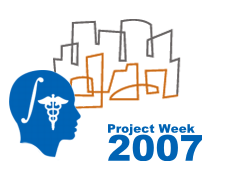Difference between revisions of "ProjectWeek200706:CorticalThicknessForAutism"
From NAMIC Wiki
Hjbockholt (talk | contribs) |
m (Projects/Structural/2007 Project Week Cortical Thickness for Autism moved to ProjectWeek200706:CorticalThicknessForAutism) |
||
| (7 intermediate revisions by 2 users not shown) | |||
| Line 24: | Line 24: | ||
Our approach is to locally compute the cortical thickness and establish local cortical correspondence in order to compare our populations. | Our approach is to locally compute the cortical thickness and establish local cortical correspondence in order to compare our populations. | ||
| − | Our plan | + | Our plan is to learn how to use FreeSurfer in a pediatric age group, and run it on several cases. |
We would also like to use our itkEMS Tissue Segmentation tool to incorporate its results in the FreeSurfer pipeline. | We would also like to use our itkEMS Tissue Segmentation tool to incorporate its results in the FreeSurfer pipeline. | ||
| − | + | Moreover a study comparison between our CortThick tool and Freesurfer needs to be done to compare methods' reliabilities. | |
</div> | </div> | ||
| Line 34: | Line 34: | ||
<h1>Progress</h1> | <h1>Progress</h1> | ||
| − | * | + | * Jeremy Bockholt helped Clement with how to set up freesurfer autorecon processes. |
| − | + | * Several pediatric cases are running on the UNC system using FreeSurfer | |
| − | + | ||
| − | * | ||
</div> | </div> | ||
Latest revision as of 15:38, 4 December 2007
Home < ProjectWeek200706:CorticalThicknessForAutism Return to Project Week Main Page |
Key Investigators
- UNC: Heather Cody Hazlett, Martin Styner, Clement Vachet
- MGH: Lilla Zollei
Objective
Our goal is to begin a longitudinal study of early brain development by cortical thickness in autistic children and controls (2 years with follow-up at 4 years). We want to be able to make statistical group comparisons.
Approach, Plan
Our approach is to locally compute the cortical thickness and establish local cortical correspondence in order to compare our populations.
Our plan is to learn how to use FreeSurfer in a pediatric age group, and run it on several cases. We would also like to use our itkEMS Tissue Segmentation tool to incorporate its results in the FreeSurfer pipeline. Moreover a study comparison between our CortThick tool and Freesurfer needs to be done to compare methods' reliabilities.
Progress
- Jeremy Bockholt helped Clement with how to set up freesurfer autorecon processes.
- Several pediatric cases are running on the UNC system using FreeSurfer